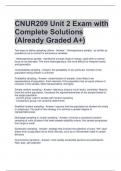Exam (elaborations)
CNUR209 Unit 2 Exam with Complete Solutions (Already Graded A+)
- Course
- Institution
CNUR209 Unit 2 Exam with Complete Solutions (Already Graded A+) Two ways to define sampling criteria - Answer- · Homogeneous sample - as similar as possible so as to control for extraneous variables · Heterogeneous sample - represents a broad range of values, used when a narrow focus is not...
[Show more]



